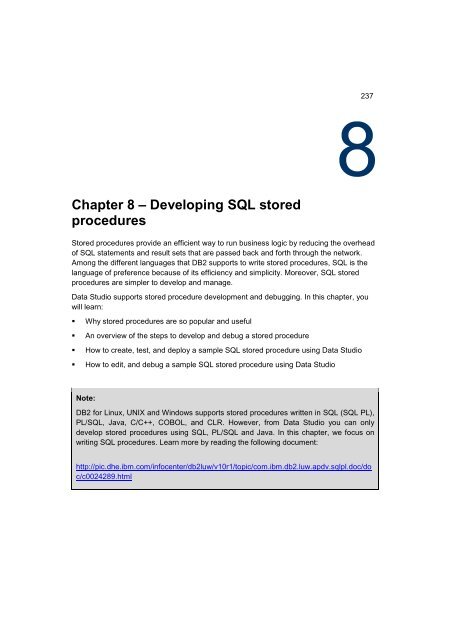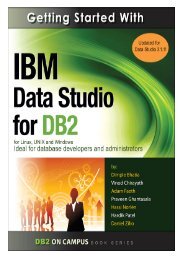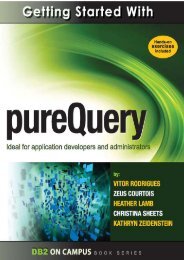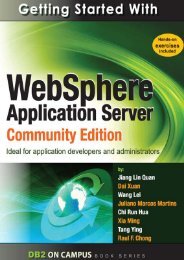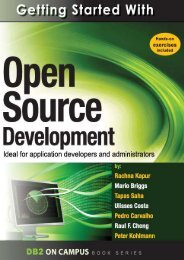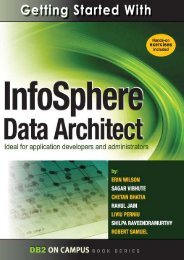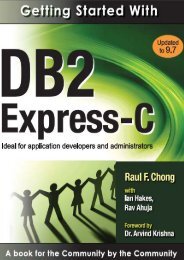- Page 1 and 2:
]
- Page 3 and 4:
3 Notices This information was deve
- Page 5 and 6:
Table of contents 5 Table of conten
- Page 7 and 8:
3.3.1 Exporting data...............
- Page 9 and 10:
Chapter 7 - Tuning queries ........
- Page 11 and 12:
11.4 Community and resources ......
- Page 13 and 14:
Preface 13 Keeping your skills curr
- Page 15 and 16:
around the world have participated
- Page 17 and 18:
17 About the authors Dimple Bhatia
- Page 19 and 20:
Contributors 19 The following peopl
- Page 21:
21 Acknowledgements The authors owe
- Page 24 and 25:
24 Getting Started with IBM Data St
- Page 26 and 27:
26 Getting Started with IBM Data St
- Page 28 and 29:
28 Getting Started with IBM Data St
- Page 30 and 31:
30 Getting Started with IBM Data St
- Page 32 and 33:
32 Getting Started with IBM Data St
- Page 34 and 35:
34 Getting Started with IBM Data St
- Page 36 and 37:
36 Getting Started with IBM Data St
- Page 38 and 39:
38 Getting Started with IBM Data St
- Page 40 and 41:
40 Getting Started with IBM Data St
- Page 42 and 43:
42 Getting Started with IBM Data St
- Page 44 and 45:
44 Getting Started with IBM Data St
- Page 46 and 47:
46 Getting Started with IBM Data St
- Page 48 and 49:
48 Getting Started with IBM Data St
- Page 50 and 51:
50 Getting Started with IBM Data St
- Page 52 and 53:
52 Getting Started with IBM Data St
- Page 54 and 55:
54 Getting Started with IBM Data St
- Page 56 and 57:
56 Getting Started with IBM Data St
- Page 58 and 59:
58 Getting Started with IBM Data St
- Page 60 and 61:
60 Getting Started with IBM Data St
- Page 62 and 63:
62 Getting Started with IBM Data St
- Page 64 and 65:
64 Getting Started with IBM Data St
- Page 66 and 67:
66 Getting Started with IBM Data St
- Page 68 and 69:
68 Getting Started with IBM Data St
- Page 70 and 71:
70 Getting Started with IBM Data St
- Page 72 and 73:
72 Getting Started with IBM Data St
- Page 74 and 75:
74 Getting Started with IBM Data St
- Page 76 and 77:
76 Getting Started with IBM Data St
- Page 78 and 79:
78 Getting Started with IBM Data St
- Page 80 and 81:
80 Getting Started with IBM Data St
- Page 82 and 83:
82 Getting Started with IBM Data St
- Page 84 and 85:
84 Getting Started with IBM Data St
- Page 86 and 87:
86 Getting Started with IBM Data St
- Page 88 and 89:
88 Getting Started with IBM Data St
- Page 90 and 91:
90 Getting Started with IBM Data St
- Page 92 and 93:
92 Getting Started with IBM Data St
- Page 94 and 95:
94 Getting Started with IBM Data St
- Page 96 and 97:
96 Getting Started with IBM Data St
- Page 98 and 99:
98 Getting Started with IBM Data St
- Page 100 and 101:
100 Getting Started with IBM Data S
- Page 103 and 104:
103 Chapter 3 - Maintaining the dat
- Page 105 and 106:
Chapter 3 - Maintaining the databas
- Page 107 and 108:
Chapter 3 - Maintaining the databas
- Page 109 and 110:
Chapter 3 - Maintaining the databas
- Page 111 and 112:
Chapter 3 - Maintaining the databas
- Page 113 and 114:
Chapter 3 - Maintaining the databas
- Page 115 and 116:
Chapter 3 - Maintaining the databas
- Page 117 and 118:
Chapter 3 - Maintaining the databas
- Page 119 and 120:
Chapter 3 - Maintaining the databas
- Page 121 and 122:
Chapter 3 - Maintaining the databas
- Page 123 and 124:
Chapter 3 - Maintaining the databas
- Page 125 and 126:
Chapter 3 - Maintaining the databas
- Page 127 and 128:
Chapter 3 - Maintaining the databas
- Page 129 and 130:
Chapter 3 - Maintaining the databas
- Page 131 and 132:
Chapter 3 - Maintaining the databas
- Page 133 and 134:
Figure 3.35 - Selecting additional
- Page 135 and 136:
Chapter 3 - Maintaining the databas
- Page 137:
Chapter 3 - Maintaining the databas
- Page 140 and 141:
140 Getting Started with IBM Data S
- Page 142 and 143:
142 Getting Started with IBM Data S
- Page 144 and 145:
144 Getting Started with IBM Data S
- Page 146 and 147:
146 Getting Started with IBM Data S
- Page 148 and 149:
148 Getting Started with IBM Data S
- Page 150 and 151:
150 Getting Started with IBM Data S
- Page 152 and 153:
152 Getting Started with IBM Data S
- Page 154 and 155:
154 Getting Started with IBM Data S
- Page 156 and 157:
156 Getting Started with IBM Data S
- Page 159 and 160:
159 Chapter 5 - Creating SQL and XQ
- Page 161 and 162:
Chapter 5 - Creating SQL and XQuery
- Page 163 and 164:
Chapter 5 - Creating SQL and XQuery
- Page 165 and 166:
Chapter 5 - Creating SQL and XQuery
- Page 167 and 168:
Chapter 5 - Creating SQL and XQuery
- Page 169 and 170:
Chapter 5 - Creating SQL and XQuery
- Page 171 and 172:
Chapter 5 - Creating SQL and XQuery
- Page 173 and 174:
Chapter 5 - Creating SQL and XQuery
- Page 175 and 176:
Chapter 5 - Creating SQL and XQuery
- Page 177 and 178:
Chapter 5 - Creating SQL and XQuery
- Page 179 and 180:
Chapter 5 - Creating SQL and XQuery
- Page 181 and 182:
On Success On Error Result Chapter
- Page 183 and 184:
Chapter 5 - Creating SQL and XQuery
- Page 185 and 186: Chapter 5 - Creating SQL and XQuery
- Page 187 and 188: Chapter 5 - Creating SQL and XQuery
- Page 189 and 190: Chapter 5 - Creating SQL and XQuery
- Page 191 and 192: Chapter 5 - Creating SQL and XQuery
- Page 193 and 194: 193 Chapter 6 - Managing jobs Job m
- Page 195 and 196: Chapter 6 - Managing jobs 195 6.3 J
- Page 197 and 198: Chapter 6 - Managing jobs 197 6.4 C
- Page 199 and 200: Chapter 6 - Managing jobs 199 Figur
- Page 201 and 202: Chapter 6 - Managing jobs 201 Comp
- Page 203 and 204: Chapter 6 - Managing jobs 203 Figur
- Page 205 and 206: Chapter 6 - Managing jobs 205 Figur
- Page 207 and 208: Chapter 6 - Managing jobs 207 6.5 R
- Page 209 and 210: Chapter 6 - Managing jobs 209 6.6.2
- Page 211 and 212: Chapter 6 - Managing jobs 211 Figur
- Page 213 and 214: 213 Chapter 7 - Tuning queries In t
- Page 215 and 216: Chapter 7 - Tuning queries 215 Figu
- Page 217 and 218: Chapter 7 - Tuning queries 217 You
- Page 219 and 220: Chapter 7 - Tuning queries 219 •
- Page 221 and 222: Chapter 7 - Tuning queries 221 Figu
- Page 223 and 224: 7.4.2 Run the Statistics Advisor an
- Page 225 and 226: Chapter 7 - Tuning queries 225 7.4.
- Page 227 and 228: Chapter 7 - Tuning queries 227 For
- Page 229 and 230: Chapter 7 - Tuning queries 229 Figu
- Page 231 and 232: Chapter 7 - Tuning queries 231 To s
- Page 233 and 234: Chapter 7 - Tuning queries 233 3. O
- Page 235: Chapter 7 - Tuning queries 235 7.6
- Page 239 and 240: Chapter 8 - Developing SQL stored p
- Page 241 and 242: Chapter 8 - Developing SQL stored p
- Page 243 and 244: Chapter 8 - Developing SQL stored p
- Page 245 and 246: Chapter 8 - Developing SQL stored p
- Page 247 and 248: Chapter 8 - Developing SQL stored p
- Page 249 and 250: Chapter 8 - Developing SQL stored p
- Page 251 and 252: Chapter 8 - Developing SQL stored p
- Page 253 and 254: Chapter 8 - Developing SQL stored p
- Page 255 and 256: Chapter 8 - Developing SQL stored p
- Page 257 and 258: Chapter 8 - Developing SQL stored p
- Page 259 and 260: Chapter 8 - Developing SQL stored p
- Page 261 and 262: Chapter 8 - Developing SQL stored p
- Page 263: Chapter 8 - Developing SQL stored p
- Page 266 and 267: 266 Getting Started with IBM Data S
- Page 268 and 269: 268 Getting Started with IBM Data S
- Page 270 and 271: 270 Getting Started with IBM Data S
- Page 272 and 273: 272 Getting Started with IBM Data S
- Page 274 and 275: 274 Getting Started with IBM Data S
- Page 276 and 277: 276 Getting Started with IBM Data S
- Page 278 and 279: 278 Getting Started with IBM Data S
- Page 280 and 281: 280 Getting Started with IBM Data S
- Page 282 and 283: 282 Getting Started with IBM Data S
- Page 284 and 285: 284 Getting Started with IBM Data S
- Page 286 and 287:
286 Getting Started with IBM Data S
- Page 288 and 289:
288 Getting Started with IBM Data S
- Page 290 and 291:
290 Getting Started with IBM Data S
- Page 292 and 293:
292 Getting Started with IBM Data S
- Page 294 and 295:
294 Getting Started with IBM Data S
- Page 296 and 297:
296 Getting Started with IBM Data S
- Page 298 and 299:
298 Getting Started with IBM Data S
- Page 300 and 301:
300 Getting Started with IBM Data S
- Page 302 and 303:
302 Getting Started with IBM Data S
- Page 304 and 305:
304 Getting Started with IBM Data S
- Page 306 and 307:
306 Getting Started with IBM Data S
- Page 308 and 309:
308 Getting Started with IBM Data S
- Page 310 and 311:
310 Getting Started with IBM Data S
- Page 312 and 313:
312 Getting Started with IBM Data S
- Page 314 and 315:
314 Getting Started with IBM Data S
- Page 316 and 317:
316 Getting Started with IBM Data S
- Page 318 and 319:
318 Getting Started with IBM Data S
- Page 320 and 321:
320 Getting Started with IBM Data S
- Page 322 and 323:
322 Getting Started with IBM Data S
- Page 324 and 325:
324 Getting Started with IBM Data S
- Page 326 and 327:
326 Getting Started with IBM Data S
- Page 328 and 329:
328 Getting Started with IBM Data S
- Page 330 and 331:
330 Getting Started with IBM Data S
- Page 332 and 333:
332 Getting Started with IBM Data S
- Page 334 and 335:
334 Getting Started with IBM Data S
- Page 336 and 337:
336 Getting Started with IBM Data S
- Page 338 and 339:
338 Getting Started with IBM Data S
- Page 340 and 341:
340 Getting Started with IBM Data S
- Page 342 and 343:
342 Getting Started with IBM Data S
- Page 344 and 345:
344 Getting Started with IBM Data S
- Page 346 and 347:
346 Getting Started with IBM Data S
- Page 348 and 349:
348 Getting Started with IBM Data S
- Page 350 and 351:
350 Getting Started with IBM Data S
- Page 352 and 353:
352 Getting Started with IBM Data S
- Page 355 and 356:
355 Appendix D - The Sample Outdoor
- Page 357 and 358:
Appendix D - The Sample Outdoor Com
- Page 359 and 360:
Appendix D - The Sample Outdoor Com
- Page 361 and 362:
Appendix D - The Sample Outdoor Com
- Page 363 and 364:
Appendix E - Advanced topics for de
- Page 365 and 366:
Appendix E - Advanced topics for de
- Page 367 and 368:
Appendix E - Advanced topics for de
- Page 369 and 370:
Appendix E - Advanced topics for de
- Page 371 and 372:
Appendix E - Advanced topics for de
- Page 373 and 374:
Appendix E - Advanced topics for de
- Page 375 and 376:
Appendix E - Advanced topics for de
- Page 377 and 378:
Appendix E - Advanced topics for de
- Page 379 and 380:
Appendix E - Advanced topics for de
- Page 381 and 382:
Appendix E - Advanced topics for de
- Page 383 and 384:
Appendix E - Advanced topics for de
- Page 385 and 386:
Appendix E - Advanced topics for de
- Page 387 and 388:
Appendix E - Advanced topics for de
- Page 389 and 390:
E.5.4 Data web services artifacts A
- Page 391 and 392:
References 391 References [1] HAYES
- Page 393 and 394:
References 393 Books and articles 1
- Page 396:
396 Getting started with IBM Data S


